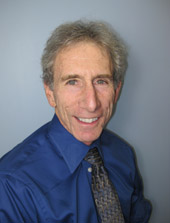David Sherr Wins BU Ignition Award to Advance Breast Cancer Prevention and Treatment
David Sherr, PhD, a professor of environmental health at Boston University School of Public Health, has been named a recipient of Boston University’s highly sought-after Ignition Award, which he will use toward the development of a drug to prevent and treat breast cancer.

Ignition Awards are presented to four BU researchers twice a year by the University’s Office of Technology Development, providing them with funding to move their research discoveries into practical implementation. This summer, Sherr was recognized in the health care category.
Sherr and a team of collaborators will use the $50,000 award to develop an inhibitor for the aryl hydrocarbon receptor (AhR), a protein that plays a unique role in initiating the development of cancerous cells and in the process of transforming those cells from benign to malignant.
AhR is understood to control how cells respond to environmental pollutants, such as dioxins, PCBs and hydrocarbons. With regard to breast cancer in particular, it appears to play a large role both in the initiation of the cancer and its progression towards a malignant, invasive tumor. Importantly, the AhR appears to influence both the malignant development of tumors induced by chemical exposure and those that are not.
“The thought is that if we can develop an inhibitor to stop AhR, we can prevent breast cancer from developing or metastasizing,” Sherr said.
Sherr, who is also a professor of pathology and laboratory science at BU School of Medicine, began investigating the link between AhR and cancerous cells while studying the role environmental pollutants play in generating cancers. He found that AhR was the driving force in turning cells exposed to environmental toxins into malignant cancers.
“Now, the next step is to move into the translational research phase and generate a drug,” he said. “It’s great to have this connection with the Office of Technology Development and the support that they provide for these translational studies,” he said.
Sherr has been working with Jennifer Schlezinger, associate professor of environmental health at BUSPH, and Sarah Molina, founding director of the BUMC High Throughput Screening Core, to screen for potential AhR inhibitors. From more than 3,000 compounds screened, they have identified several which interact with the AhR and 3 that appear to selectively inhibit its activity.
According to Sherr, preliminary studies show that in addition to breast cancer, such a drug could also be used to prevent and treat other forms of cancer including lymphoma, myeloma, prostate and ovarian cancer. He noted that recent studies published in Nature, Nature Immunology, and the Journal of Experimental Medicine have shown that AhR also plays a role in other diseases, such as autoimmune and inflammatory diseases. A recent report in Science suggests that the AhR also regulates production of stem cells.
“Being able to manipulate AhRs might have enormous implications,” Sherr said.
Sherr’s laboratory at BUSPH employs state-of-the-art cellular and molecular technologies to research three specific areas of basic and applied science. These include mechanisms through which environmental chemicals suppress the immune system; mechanisms through which molecular signaling leads to environmental, carcinogen-induced and spontaneous breast cancers; and the development of vaccines for the treatment of cancer and primary amyloidosis. The common element in these three disciplines is the involvement of AhR in the suppression of the immune system and in driving tumor cell growth and, it is postulated, invasion.
In addition to Sherr, Schlezinger, and Molina, collaborators on this project include Supraja Narasimhan, a graduate student at BU School of Medicine; Scott Schaus, associate professor of chemistry at BUSM; and Michael Pollastri, associate professor of chemistry and chemical biology at Northeastern University.
This is the second Ignition Award to be presented to a BUSPH researcher. Yesim Tozan, an assistant professor of international health at BUSPH, received the award in 2009 to develop a “toolbox” for delivering malaria treatments in rural areas of Africa.
Submitted by Michelle Salzman.